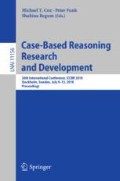Abstract
Due to the development of the global security situation, the existence and implementation of security concepts became an important aspect of public events. The definition and writing of a security concept demands domain knowledge and experience. This paper describes an approach for the automated retrieval and generation of security concept templates based on reliable examples. We use ontologies for the conceptualization of textual security concepts, and we employ case-based reasoning for the retrieval and generation of new security concepts.
Access this chapter
Tax calculation will be finalised at checkout
Purchases are for personal use only
References
Amailef, K., Lu, J.: Mobile-based emergency response system using ontology-supported information extraction. In: Lu, J., Jain, L.C., Zhang, G. (eds.) Handbook on Decision Making. Intelligent Systems Reference Library, vol. 33, pp. 429–449. Springer, Heidelberg (2012). https://doi.org/10.1007/978-3-642-25755-1_21
van Assem, M., Malaisé, V., Miles, A., Schreiber, G.: A method to convert thesauri to SKOS. In: Sure, Y., Domingue, J. (eds.) ESWC 2006. LNCS, vol. 4011, pp. 95–109. Springer, Heidelberg (2006). https://doi.org/10.1007/11762256_10
Bach, K., Althoff, K.-D.: Developing case-based reasoning applications using myCBR 3. In: Agudo, B.D., Watson, I. (eds.) ICCBR 2012. LNCS, vol. 7466, pp. 17–31. Springer, Heidelberg (2012). https://doi.org/10.1007/978-3-642-32986-9_4
Bach, K., Sauer, C., Althoff, K.D., Roth-Berghofer, T.: Knowledge modeling with the open source tool myCBR. In: Proceedings of the 10th International Conference on Knowledge Engineering and Software Engineering, KESE 2014, vol. 1289, pp. 84–94. CEUR-WS.org, Aachen (2014)
Baumeister, J., Reutelshoefer, J., Puppe, F.: Engineering intelligent systems on the knowledge formalization continuum. Int. J. Appl. Math. Comput. Sci. (AMCS) 21(1), 27–39 (2011)
Baumeister, J., Reutelshoefer, J., Puppe, F.: KnowWE: a semantic wiki for knowledge engineering. Appl. Intell. 35(3), 323–344 (2011)
Bergmann, R.: Experience Management. Springer, Heidelberg (2002). https://doi.org/10.1007/3-540-45759-3
Cotton, F., Gillman, D.W., Jaques, Y.: XKOS: extending SKOS for describing statistical classifications. In: Proceedings of the 1st International Workshop on Semantic Statistics Co-located with 12th International Semantic Web Conference, Sydney, Australia (2013)
DIN: German Institute of Standardization. https://www.din.de
EuroVoc. https://www.eurovoc.europa.eu
Gundel, S.: Security for Places of Public Assembly and Events. Richard Boorberg Verlag, Stuttgart (2017)
Gutsche, H., Riemann, J., Sommer, S.: Security Concepts. VHZ Verlagshaus Zitzmann Nrnberg (2016)
Haghighi, P.D., Burstein, F., Zaslavsky, A., Arbon, P.: Development and evaluation of ontology for intelligent decision support in medical emergency management for mass gatherings. Decis. Support. Syst. 54(2), 1192–1204 (2013)
Kang, K.C., Cohen, S.G., Hess, J.A., Novak, W.E., Peterson, A.S.: Feature-oriented domain analysis (FODA) feasibility study. Carnegie Mellon University, Technical report (1990)
Lakkaraju, P., Gauch, S., Speretta, M.: Document similarity based on concept tree distance. In: Proceedings of the Nineteenth ACM Conference on Hypertext and Hypermedia, HT 2008, pp. 127–132. ACM, New York (2008)
Moreau, L., Groth, P.: Provenance: An Introduction to PROV. Synthesis Lectures on the Semantic Web: Theory and Technology. Morgan and Claypool, San Rafeal (2013)
Paul, S., Ebner, M., Klode, K., Sakschewski, T.: Security Concepts for Events. DIN Beuth, Berlin (2014)
Perry, J.W., Kent, A., Berry, M.M.: Machine literature searching X. machine language; factors underlying its design and development. Am. Doc. 6(4), 242–254 (1955)
Roth-Berghofer, T., Adrian, B., Dengel, A.: Case acquisition from text: ontology-based information extraction with SCOOBIE for myCBR. In: Bichindaritz, I., Montani, S. (eds.) ICCBR 2010. LNCS, vol. 6176, pp. 451–464. Springer, Heidelberg (2010). https://doi.org/10.1007/978-3-642-14274-1_33
Segura, S., Benavides, D., Ruiz-Cortés, A., Trinidad, P.: Automated merging of feature models using graph transformations. In: Lämmel, R., Visser, J., Saraiva, J. (eds.) GTTSE 2007. LNCS, vol. 5235, pp. 489–505. Springer, Heidelberg (2008). https://doi.org/10.1007/978-3-540-88643-3_15
W3C: OWL2 Profiles, April 2009. http://www.w3.org/tr/owl2-profiles/
W3C: SKOS Simple Knowledge Organization System Reference, August 2009. http://www.w3.org/TR/skos-reference
W3C: PROV-O: The PROV Ontology, April 2013. http://www.w3.org/TR/prov-o
Author information
Authors and Affiliations
Corresponding author
Editor information
Editors and Affiliations
Rights and permissions
Copyright information
© 2018 Springer Nature Switzerland AG
About this paper
Cite this paper
Korger, A., Baumeister, J. (2018). The SECCO Ontology for the Retrieval and Generation of Security Concepts. In: Cox, M., Funk, P., Begum, S. (eds) Case-Based Reasoning Research and Development. ICCBR 2018. Lecture Notes in Computer Science(), vol 11156. Springer, Cham. https://doi.org/10.1007/978-3-030-01081-2_13
Download citation
DOI: https://doi.org/10.1007/978-3-030-01081-2_13
Published:
Publisher Name: Springer, Cham
Print ISBN: 978-3-030-01080-5
Online ISBN: 978-3-030-01081-2
eBook Packages: Computer ScienceComputer Science (R0)

